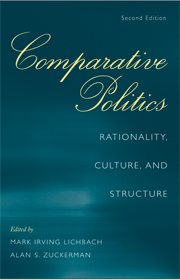Book contents
- Frontmatter
- Contents
- Contributors
- Preface and Acknowledgments
- 1 PARADIGMS AND PRAGMATISM
- 2 THINKING AND WORKING IN THE MIDST OF THINGS
- 3 ADVANCING EXPLANATION IN COMPARATIVE POLITICS
- 4 STRONG THEORY, COMPLEX HISTORY
- 5 RECONSIDERATIONS OF RATIONAL CHOICE IN COMPARATIVE AND HISTORICAL ANALYSIS
- 6 CULTURE IN COMPARATIVE POLITICAL ANALYSIS
- 7 RESEARCHING THE STATE
- 8 AN APPROACH TO COMPARATIVE ANALYSIS OR A SUBFIELD WITHIN A SUBFIELD?
- 9 THE GLOBAL CONTEXT OF COMPARATIVE POLITICS
- 10 COMPARATIVE PERSPECTIVES ON CONTENTIOUS POLITICS
- 11 CITIZENSHIP IN DEMOCRATIC POLITICS
- 12 NESTED CITIZENS
- 13 BACK TO THE FUTURE
- 14 THE COMPARATIVE POLITICAL ECONOMY OF THE WELFARE STATE
- 15 MAKING CAUSAL CLAIMS ABOUT THE EFFECT OF “ETHNICITY”
- References
- Author Index
- Subject Index
- Titles in the series
2 - THINKING AND WORKING IN THE MIDST OF THINGS
DISCOVERY, EXPLANATION, AND EVIDENCE IN COMPARATIVE POLITICS
Published online by Cambridge University Press: 05 June 2012
- Frontmatter
- Contents
- Contributors
- Preface and Acknowledgments
- 1 PARADIGMS AND PRAGMATISM
- 2 THINKING AND WORKING IN THE MIDST OF THINGS
- 3 ADVANCING EXPLANATION IN COMPARATIVE POLITICS
- 4 STRONG THEORY, COMPLEX HISTORY
- 5 RECONSIDERATIONS OF RATIONAL CHOICE IN COMPARATIVE AND HISTORICAL ANALYSIS
- 6 CULTURE IN COMPARATIVE POLITICAL ANALYSIS
- 7 RESEARCHING THE STATE
- 8 AN APPROACH TO COMPARATIVE ANALYSIS OR A SUBFIELD WITHIN A SUBFIELD?
- 9 THE GLOBAL CONTEXT OF COMPARATIVE POLITICS
- 10 COMPARATIVE PERSPECTIVES ON CONTENTIOUS POLITICS
- 11 CITIZENSHIP IN DEMOCRATIC POLITICS
- 12 NESTED CITIZENS
- 13 BACK TO THE FUTURE
- 14 THE COMPARATIVE POLITICAL ECONOMY OF THE WELFARE STATE
- 15 MAKING CAUSAL CLAIMS ABOUT THE EFFECT OF “ETHNICITY”
- References
- Author Index
- Subject Index
- Titles in the series
Summary
I am never precisely sure where I am going or whether I will ever arrive. I write from the midst of things and I cannot see their order as yet. … I want to run but I can only drag along slowly.
Alexis de TocquevilleINTRODUCTION
Comparison always helps. Consider what Robert B. Pippin (2005: 14) writes about philosophy departments:
Why is it that philosophy departments with some range of ages among the faculty can look like a historical zoo of some sort, with “species” from various periods locked into programs that have long since ceased to generate articles, books, dissertations? The ordinary language species here, the Rawls-Nozick person there, the deontic logic type here, the Kuhnean there, the intentional inexistence specialist laboring away in this corner, the transcendental arguments skepticism-refuter over there? … [F]or the most part traditional philosophy aspires not to have a history like that of literature or art (where times and places seem profoundly relevant) but a history like chemistry (where they do not; no serious working chemist worries about the history of chemistry). But the … labels stick nonetheless and have become part of the daily discourse of philosophy.
Skeptical about coherent doctrines that define the history of ideas (Skinner 1969), John Dryzek, Bonnie Honig, and Anne Phillips (2006: 5, 6) introduce an 883-page survey of political theory with a somewhat different set of observations:
Political theory is an unapologetically mongrel sub-discipline, with no dominant methodology or approach. When asked to describe themselves, theorists will sometimes employ the shorthand of a key formative influence – as in “I'm a Deleuzean,” or Rawlsian, or Habermasian, or Arendtian – although it is probably more common to be labeled in this way by others than to claim the description oneself. […]
- Type
- Chapter
- Information
- Comparative PoliticsRationality, Culture, and Structure, pp. 18 - 71Publisher: Cambridge University PressPrint publication year: 2009
- 6
- Cited by

